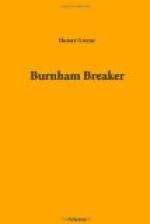Then the boys filed out. One by one they went through the door-way, each, as he passed, receiving from Mr. Burnham’s own hand the shining piece of silver that should admit him to the wonders of the “greatest show on earth.”
They spoke their thanks, rudely indeed, and in voices that were almost too much burdened with happiness for quiet speech.
But their eyes were sparkling with anticipation; their lips were parted in smiles, their white teeth were gleaming from their dust-black faces, each look and action was eloquent with thoughts of coming pleasure. And the one who enjoyed it more than all the others was Robert Burnham.
It is so old that it was trite and tiresome centuries ago, that saying about one finding one’s greatest happiness in making others happy. But it has never ceased to be true; it never will cease to be true; it is one of those primal principles of humanity that no use nor law nor logic can ever hope to falsify.
The last boy in the line differed apparently in no respect from those who had preceded him. The faces of all of them were black with coal-dust, and their clothes were patched and soiled. But this one had just cut his hand, and, as he held it up to let the blood drip from it you noticed that it was small and delicate in shape.
“Why, my boy!” exclaimed Mr. Burnham, “you have cut your hand. Let me see.”
“’Taint much, sir,” the lad replied; “I often cut ’em a little. You’re apt to, a-handlin’ the coal that way.” The man had the little hand in his and bent to examine the wound. “That’s quite a cut,” he said, “as clean as though it had been made with a knife. Come, let’s wash it off and fix it up a little.”
He led the way to the corner of the room, uncovered the water-pail, dipped out a cup of water, and began to bathe the bleeding hand.
“That shows it’s good coal, sir,” said the boy, “Poor coal wouldn’t make such a clean cut as that. The better the coal the sharper ’tis.”
“Thank you,” said Mr. Burnham, smiling. “Taking the circumstances into consideration, I regard that as the best compliment for our coal that I have ever received.”
The hand had been washed off as well as water without soap could do it.
“I guess that’s as clean as it’ll come,” said the boy. “It’s pirty hard work to git ’em real clean. The dirt gits into the corners so, an’ into the chaps an’ cuts, an’ you can’t git it all out, not even for Sunday.”
The man was looking around for something to bind up the wound with. “Have you a handkerchief?” he asked.
The boy drew from an inner pocket what had once been a red bandanna handkerchief of the old style, but alas! it was sadly soiled, it was worn beyond repair and crumpled beyond belief.
“’Taint very clean,” he said, apologetically. “You can’t keep a han’kerchy very clean a-workin’ in the breaker, it’s so dusty here.”




